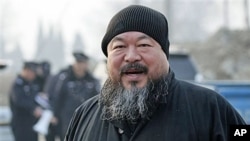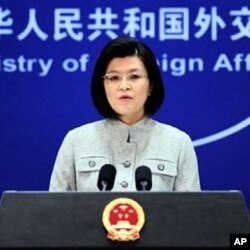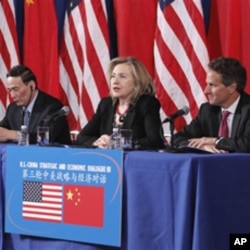The family of well-known artist-activist Ai Weiwei says he appears to be in good shape, after they were allowed to see him for the first time since he disappeared into detention more than one month ago.
Wife's visit
Ai Weiwei’s wife Lu Qing saw her husband for only about 15 minutes Sunday.
Liu Xiaoyuan, a lawyer who is close to Ai’s family, says he was told this is the first time any family member has seen the artist-activist.
Liu says Ai's wife told him Ai appears to be physically fine, and that the food he is eating while in detention is also fine. Liu says Ai only talked about personal family matters, but did not discuss any legal matters.
Activist
Ai is one of China’s most internationally famous artists. He also became known for his outspoken activism following the 2008 Sichuan earthquake, when he conducted his own investigation into the deaths of thousands of school children. The artist was among critics who blamed official corruption and shoddily-constructed school buildings for exacerbating the threat.
Although Ai was detained more than one month ago, the Chinese government has not officially notified his family about his status or whereabouts. Chinese media say he is being charged with economic crimes, but there are few details.
Information
Foreign Ministry spokeswoman Jiang Yu has brushed aside foreign reporters’ repeated questions about Ai.
Jiang says she cannot comment on the case because it is still under investigation. In the past, she has urged critics to wait for the results.
In Beijing at the end of April, Assistant Secretary of State Michael Posner pointed to the latest crackdown on dissent in China as evidence of what he described as “serious backsliding” on human rights.
“We have been and are very concerned over recent months by reports that dozens of people, including public interest lawyers, writers, artists like Ai Weiwei, and others have been arrested, detained or in some cases disappeared, with no regard to legal measures.”
Human rights
Posner’s comments came at the end of two days of US-China human rights talks in Beijing.
Another human rights controversy surfaced last week, during high-level U.S.-China strategic and economic talks in Washington. In an interview with the Atlantic Magazine, about the turmoil in the Middle East, Secretary of State Hillary Clinton called China’s human rights record “deplorable,” and said history is not on the side of governments that resist democracy.
The Chinese spokeswoman initially said reporters only partially understood Secretary Clinton’s remarks. One day later, she more bluntly rejected the U.S. official’s comments, saying it is not appropriate to compare China to North African countries that are facing turmoil.
China’s latest crackdown on dissent sharply escalated earlier this year, following the Jasmine Revolution protests that led to leadership changes in the Middle East.






